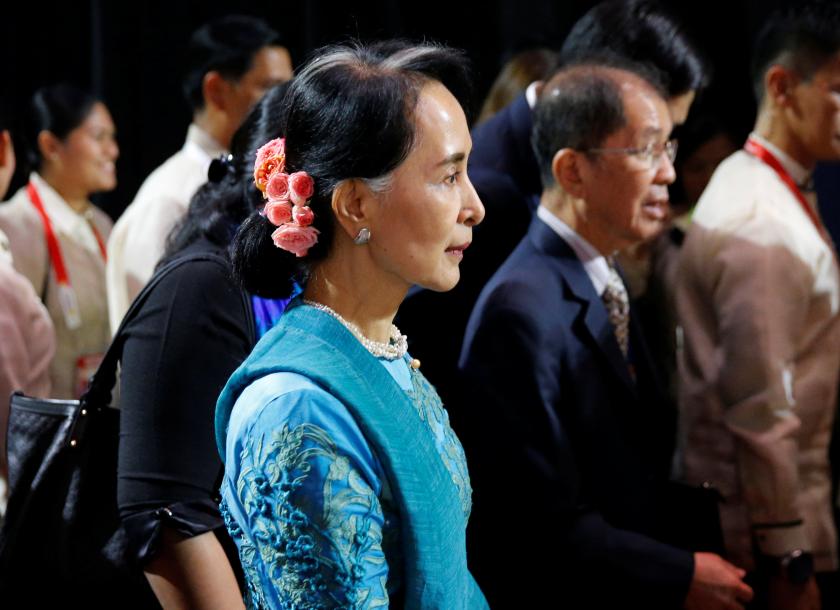After three years of negotiations, ASEAN and Hong Kong signed a free trade agreement (FTA) and investment pact on the sidelines of the 31st ASEAN Summit in Manila
15 Nov 2017
ASEAN and Hong Kong signed a free trade agreement (FTA) and a related investment agreement on the sidelines of the 31st ASEAN Summit in Manila yesterday, after three years of negotiations.
The agreements will bring about tariff reduction for the trade in goods and services, better market access, legal security, a dispute settlement mechanism as well as investment protection to Myanmar and the rest of ASEAN.
Apart from trade and investment, the deal comprises of a chapter on Economic and Technical Cooperation (ECOTECH). Both parties, including Myanmar, have agreed to conduct ECOTECH activities in five areas: customs cooperation, professional services, small and medium-sized enterprises (SME) cooperation, trade facilitation and logistics as well as e-commerce cooperation.
The two parties began the negotiations in July 2014 and concluded in September this year. Among the economic ministers who signed the agreements was U Kyaw Win, Union Minister for the Ministry of Commerce.
Hong Kong’s Secretary for Commerce and Economic Development, Edward Yau, said the two agreements will not only strengthen the trade and investment flows between the two regions but also boost business opportunities for Hong Kong enterprises and service-providers in ASEAN markets.
“All ASEAN member states are also economies along the Belt and Road. The agreements will extend Hong Kong's FTA and Investment Agreement network to cover all major economies in Southeast Asia. The closer ties forged will enhance Hong Kong's role as a trading and investment hub and cater [to] our strategy to tap the business opportunities offered by the Belt and Road Initiative,” Mr Yau said.
The duo deals cover agreements in trade in goods and services, investment, economic and technical co-operation, dispute settlement mechanisms and others. The lowering of customs duties on goods from the city is expected to facilitate a boom in Hong Kong’s investment in the region as well as more services export to ASEAN.
Myanmar can stand to gain a lot from promoting itself through this FTA as Myanmar goods are relatively unknown compared to its ASEAN neighbours.
John Barnes, director of Marga Group, told The Myanmar Times earlier that Myanmar has an enormous potential to promote itself via the FTA as Myanmar goods are relatively unknown compared to its ASEAN neighbours. The country can also leverage the financial capital in the city.
“By engaging in more trade, Myanmar can lift its status as a key beneficiary of Hong Kong and China funds,” he said.
Melvyn Pun, chief executive officer of Yoma Strategic, added that the the deal will step up the city’s investments into the education and infrastructure sectors in Myanmar.
The deal provides a clear framework for trade in services, which is crucial for many Hong Kong investors to accelerate their plans in Myanmar, according to Peter Wong, regional director of Hong Kong’s Trade Development Council.
The agreements are expected to come into force on January 1, 2019, at the earliest.
Background
Bilateral merchandise trade between Hong Kong and ASEAN grew by an average of 3.4 percent annually from 2012 to 2016, according to Hong Kong’s trade and industry department. ASEAN was Hong Kong's second largest trading partner in merchandise trade in 2016, with the total merchandise trade amounting to HK$833 billion (US$106.8 billion). The average annual growth rate for total trade in services was 3.1pc in 2011-15. ASEAN was Hong Kong's fourth largest trading partner in services trade in 2015, with the total services trade amounting to HK$121 billion. As at the end of 2015, the region ranked sixth among the city’s destinations of outward direct investment, with a stock of HK$218 billion. It also ranked sixth among the territory’s sources of inward direct investment, with a stock of HK$555 billion.
For Myanmar, while the year-on-year growth in bilateral trade with Hong Kong is significant, the actual volume remains very modest and behind most ASEAN member states.
(The Myanmar Times: https://www.mmtimes.com/news/a











